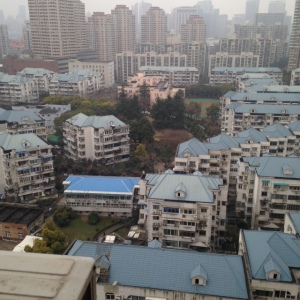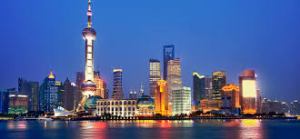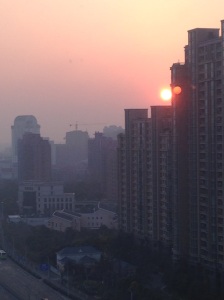If you look at a Map of Shanghai you will see that the city is bisected by a river. The geography is much like New York with the Hudson River separating the City from New Jersey. The NYU campus sits in the heart of Pudong, which is the newest section of the city and is directly across from The Bund and the historic part of Shanghai. Our apartment is even deeper into Pudong on the other side of Century Park. The side that is not Pudong is the place that people think about when they talk about Shanghai with its beautiful neighborhoods such as the French Concession, Puxi, and Xintandi. No one ever really talks about our side of the river….they just stand on the Bund and take photos of those amazing buildings. (See photo below, which shows the view over to Pudong.) Our side of the river is referred to as Pu-Jersey by the Shanghainese who rarely venture over to Pudong for anything.
At first I understood their feeling and I felt somewhat beleaguered. After all, I heap as much scorn as anyone about “the bridge and tunnel” folks who cross into Manhattan for great bars, amazing food, and exciting nightlife. Like all New Yorkers, I am pleased when they had back to their side of the river. And now, I find myself on the wrong-side, the Pu-Jersey side, of Shanghai. At first, I thought that I would just take one of the myriad of cheap ways to get to the other side — taxi, super-cheap Uber, or Metro — and spend my time there. But, I have come to reject that as a strategy for living here and enjoying it.
If you want to know the real China, then I suspect I am more likely to find it here in Pudong. I will go over to the French Concession when I am craving a great cup of coffee, cheese, a martini, or a burger. Anything you want can be bought there for a fairly steep (New York) price. In Pudong those items are not really to be found unless you head into one of the fancy malls. Pudong instead is BladeRunner territory with huge (6-10 lane) boulevards that do not encourage walking. As someone who goes out walking everyday in Brooklyn to do my grocery shopping I found this very distressing. But one day we walked towards the back of our building and into the block and found a little paradise. (See photo below) It turns out that these super blocks are filled on the inside with communities of apartments, parks, schools, food venders and groceries. No one walks on the big boulevards because all of the community life is happening on the inside of the block.
Here is what I love about my block:
1) Old men smoking cigarettes and standing next to the glass covered bulletin boards that hold the daily newspaper. They all stand around, read and talk.
2) All the kids in the park with their grandmas, who are clearly their caretakers.
3) The people doing weird-chinese-style “exercise.” I can’t explain it, but if you walk along a New York park on the lower east side you know what I am talking about. Also there are just people who stand around and move vigorously to get exercise.
4) The fruit vendor who has the most adorable kids who like to laugh at my Chinese and practice their english with me. She sells the most amazing oranges (the size of golf balls and taste like candy) and strawberries. (And I am pretty sure they are not organic, but I have gotten over that.)
5) The food vendor who sells dumplings for breakfast.
6) The food vender who sells Dan Bing for breakfast. (Click Here to watch the video)
7) The cutest dogs with down jackets on when it’s cold and rain visors when it rains.
So, I may or may not be able to experience all of this in the fancier ex-pat area of Shanghai…I doubt it. But now that I have managed to find my way around to the subway, a grocery store and can easily get the basics I am pretty happy to be over here in Pu-Jersey.



